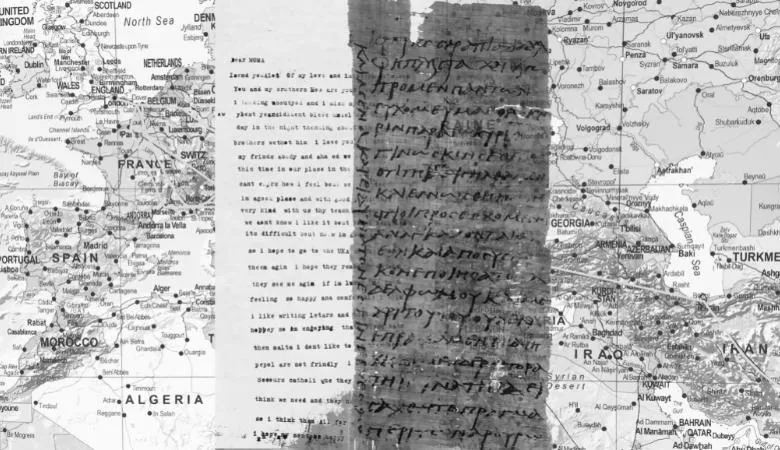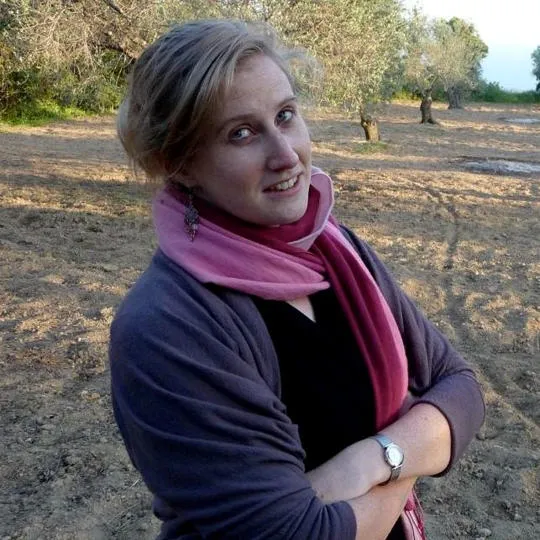Letters are simultaneously open, encouraging of connection, and a reminder of our shared humanity.
Dr James Corke-Webster
09 June 2025
In this Spotlight on Arts & Humanities, we detail the project that details what connects people across millennia — the search for shelter from war.
In June of 2024, the UN Refugee Agency found that over 120 million people across the world are currently displaced by conflict, persecution, violence and human rights violations.
In the UK, the subjects of immigration and small boat crossings were central to election campaign debates, paralleling the discussion of immigration policies by politicians in European elections this year. But, according to charity ArtRefuge - a UK based charity dedicated to using art therapy to contribute to the wellbeing of displaced people - media coverage of the crisis is often ‘hostile’ and ‘rarely gives much insight’ into the lives of those seeking refuge from disaster and conflict.
The Letters of Refuge project, led by Dr James Corke-Webster in collaboration with Art Refuge, draws on sources from ancient history to bring together historical and contemporary experiences of displacement and persecution. The project is inspired by research methodologies that envisage antiquity as a safe place from which to explore issues of contemporary relevance.
Dr Corke-Webster, a classicist and historian at King’s with a keen interest in the persecution and displacement of minority groups under the Roman empire, wanted to know whether his research on early Christian persecution could have a wider impact. He and Bobby Lloyd, the CEO of Art Refuge, were particularly struck by the potential of reading ancient letters describing Christian experiences with contemporary refugees.
He explains that “at a pilot workshop, the art therapists [at Art Refuge] noticed that much of this ancient material was in the form of letters, and that these were more accessible”. Together, Dr Corke-Webster and Art Refuge designed a series of workshops that would use short extracts from a selection of letters written under the Roman empire, and then invited refugees to respond to these and write letters of their own.
The Community Table: 2022 Workshops
In 2022, two workshops were held with refugee participants in Folkestone and Calais. They adopted Art Refuge’s pioneering ‘The Community Table’ approach, which encourages displaced people to creatively reflect and express themselves in response to prompts from literature, photography, art and poetry in a purpose-built therapeutic pop-up space.
The Community Table was used to display the team’s selection of extracts from letters written by early Christians, which became the catalyst for refugees to reflect on their own experiences.
Using old typewriters, attendees drafted their own letters to a range of recipients including family members back home in Eritrea, Afghanistan and the Sudan, the Prime Minister of the UK, and the President of France. Dr Corke-Webster explains that there is “something cathartic in the use of typewriters, since the physicality and ponderousness of typing really helps calm the mind as you transfer thought to paper.”
Letters of Refuge: 2023 Exhibition
An exhibition was subsequently held in March 2023 at King’s which showcased these ancient and modern letters side-by-side against a backdrop of maps detailing their origin. It also featured reflections offered by two contemporary artists, Aida Silvestri and Josie Carter, on the experience of being uprooted from home. These works were accompanied by photographs, the Community Table itself, and typewriters which enabled visitors to write their own letters in response to the exhibition’s themes.

Being Human Festival: Folkestone 2023
In November 2023, Dr Corke-Webster and Dr Emily Pillinger from the Classics Department came together to run a workshop with Art Refuge for men living in UK Home Office accommodation, as part of the UK’s national festival of the humanities, Being Human. The workshop, Writing Home: Myth, Letters, and Refugee Well-Being, was a collaboration between Letters of Refuge and Dr Pillinger’s project, Penelope’s Web, which seeks to amplify unheard voices of ancient Greek myth through contemporary opera.
The Community Table was laid with art and writing materials, maps and a collection of sources offering a window into Odysseus’ experience of displacement in Homer’s Odyssey. Alongside European translations of the text, passages were translated into Arabic, Farsi, and Pashto by ESL students at King’s.
Ovid. Her. 1.57-62, 71-76,
As it is, I don’t know what to fear; instead I crazily fear everything,
and the world is an empty slate for all my worries.
Whatever dangers there are at sea, whatever dangers there are on land,
I imagine that they could be the reason for such a long delay.
While I’m stupidly panicking about these dangers, you may have fallen
in love with a foreigner. It wouldn’t be untypical for a man like you.
trans. E. Pillinger
"Most participants had begun their routes to the UK from Syria, Iran, Iraq, or Afghanistan. They had taken many routes: via Turkey, Belarus, Italy, or Bulgaria. Some had spent months, even years, in Greek camps. Others had been forced to camp in freezing Bulgarian forests. Some had been injured working in factories en route. Others had been attacked by police dogs. Like Odysseus, many had been forced to double back at least one, to the first European country in which they had been fingerprinted.” Dr Emily Pillinger.
Individuals marked their journeys on maps of West Asia, North Africa, and Europe, played music, shared photographs, and wrote postcards home. The continuities and differences between the stories presented in the room helped to shed new light on the experience of displacement, ancient and modern, and demonstrated how different technologies can be used to manage communication across barriers of time, distance and language. Dr Corke-Webster explains that the project’s focus on letters was particularly effective because “they’re fundamentally dialectical, about communication – so the very medium is simultaneously open, encouraging of connection, and a reminder of our shared humanity.”
Across its series of workshops, Letters of Refuge has provided refugees with valuable opportunities to explore their own displacement in writing and made an important contribution to the historiography of this subject area, much of which has been conducted from the “top-down”.
By elevating the voices of those who have experienced displacement firsthand, the project emphasises that behind abstract numbers lie compelling individual stories with antecedents in a much longer narrative of persecution and movement around the globe.


